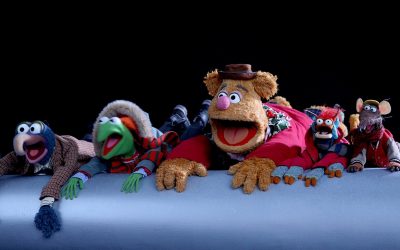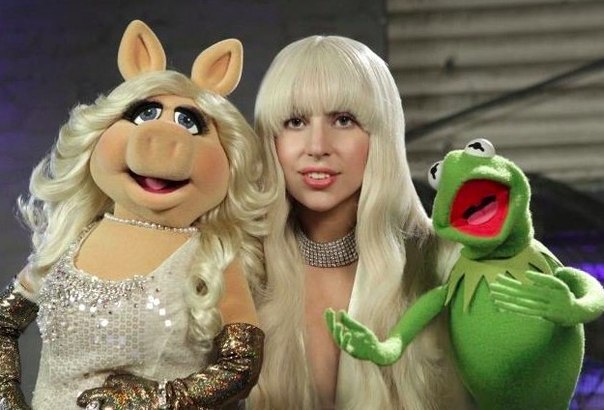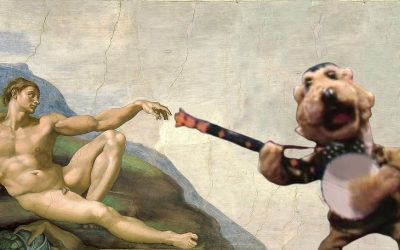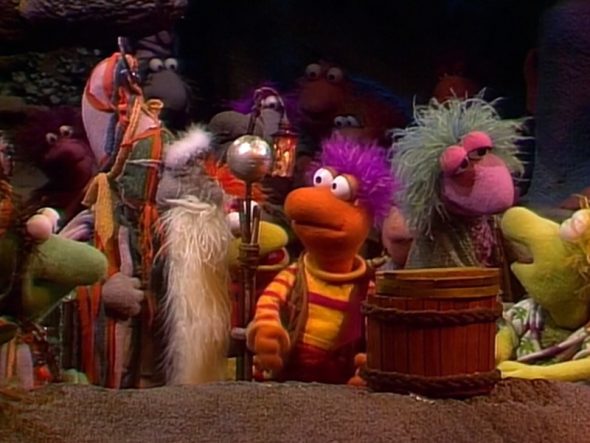
Original air date: April 25, 1983
When trying to talk or write about Fraggle Rock, I find I have to seriously consider what I want an episode of a show like this to do. Do I want it to make me laugh? Usually, a little, I suppose. Do I want it to bring peace to the world? That would be nice, but it’s a rather high bar. Do I want it to teach a simple moral lesson by focusing on a character who makes a mistake and then learns to do the right thing? For most children’s shows, that last one isn’t even a question – didactic training in both common knowledge (e.g. how to count) and moral lessons (e.g. don’t bite your friends) is what a children’s show is for, right?
Not for Fraggle Rock. What makes this such an intelligent show is how often it is comfortable with foregoing the traditional dispensing of moral platitudes in favor of showing how patterns of human thought and behavior play out and letting the viewer figure out how to think about such patterns. An excellent example of this is the underappreciated episode “Capture the Moon”.
This episode takes place on the night of a full moon. The opening with Doc and Sprocket (in both the US and UK versions) emphasizes that some human cultures used to try to capture the moon, underlining that, while the species has been changed to Fraggles to protect the innocent, this story is really about the way human societies think.
The Fraggles believe that the reflection of the moon they see in their pond through the Gorg’s well is the moon itself. Or at least it’s their moon. They think it lives in the water. However, it only appears once a month. While this pattern of nature is obviously beyond their control, this story presents us with three ways in which people might try to gain a sense of control in a world governed by such natural forces.
The first means of having a sense of control is ritual. In the Monthly Festival of the Fraggle Moon, a parade of Fraggles in matching hats carry moon-themed banners as they sing “Shine on Us Now”, and World’s Oldest begins the ceremony. “And each month, a different Fraggle is given the honor of celebrating the arrival of the moon,” he explains. “Some Fraggles sing, some dance. Weird Marvin made a statue out of carved radishes.” I suppose that was the original name they had for Large Marvin, but that’s beside the point. The point is, rituals like birthdays and annual holidays give predictability and structure to our lives, along with a sense of connectedness and time to reflect. Cultural traditions, such as the various winter solstice celebrations, give us a sense that we’re part of something bigger than any one of us, and maybe part of something bigger than all of us.
The second means of having a sense of control is the direct approach: literally trying to seize command of things. Gobo is determined to capture the moon so they can always enjoy its light. While electricity once seemed untouchable to us silly creatures, we’ve somehow captured the whole darn electromagnetic spectrum to milk it for endless light, plus communication and entertainment and everything else. From fire to farming to solar power and bottled water, we have a habit of taking as much control of nature as we can get. This has been… consequential, but I guess it’s an understandable response to being so helplessly dependent on nature even as animals have tried to kill us and our sun is content with burning us. I can’t help but wonder if the same controlling impulse played a part in our own efforts to lay claim to the moon when we stuck a flag in it and brought pieces of it home.
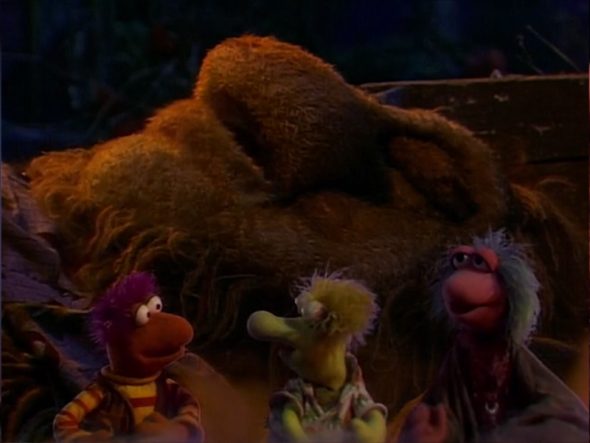
When Junior falls into the well, he blocks the moon from reflecting in the pond, so the Fraggles think he’s stolen their moon. Gobo and friends go to the garden to retrieve it, which they believe they have done successfully when Wembley sees the moon reflected in their cup. Upon returning to the rock, they don’t see it in the cup and become concerned until clouds pass and it appears again in the pond. Gobo induces, “the moon slipped away from the Gorg and hid in our barrel. […]First the Gorg had it, then it was in the cup, now it’s in the pond; it kept moving ‘til it came home!”
This third means of gaining a sense of control is organizing events into narratives. There’s a simplified version of this process in the US version of the postcard segment. Uncle Matt happens upon a place called Rainbow Farms, and he assumes this is where rainbows come from. He sits in front of an egg in a chicken’s nest to watch the rainbow hatch. He doses off and later wakes to find the egg has hatched. He looks out at the sky, spots a rainbow, and remarks, “Oh how quickly they grow up!” The narratives Gobo and Matt have told themselves turn knowledge gaps into story beats, correlations into causations, and coincidences into consciousness. It’s all so very human.
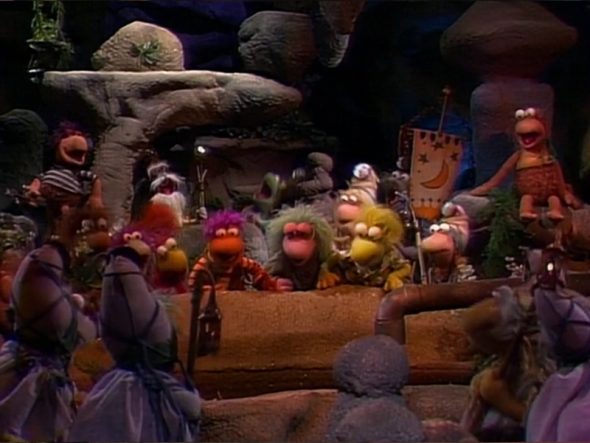
It’s hard for me to determine how far the show wants us to run with this critical thinking about the ways we try to take the reins of the cosmic, or at least bring it into the scope of our intuition and make it predictable. Does this hippy show by the hippy Henson who went to psychics and palm-readers want us to be extreme skeptics of every human experience that we can chalk up to pattern recognition and creating our own narratives? Probably not, but it’s my nature. I somehow come out of this episode with a renewed sense of the strangeness of the human inclination to see connections between the movements of the stars and our own actions, but that’s probably just me. (I get the impression that most Fraggle fans are into that sort of thing, and I say it’s because they’re total libras or geminis or cancers or prancers or vixens or whatever the heck.)
In any case, I love certain kinds of traditions – I get really into Christmas, and I’d be happy to sing “Shine on Us Now” every month like the Fraggles – so I’m part of the silliness too. Which is fine! Silly creatures are supposed to be silly. That’s kind of our whole deal. What’s great about watching Fraggle Rock is the insight we get into how our silliness takes shape and unfolds. What we do once we’ve seen these patterns is up to us. Fraggle Rock isn’t here to tell us exactly what to do or who to be. It’s here to shine a light on us.
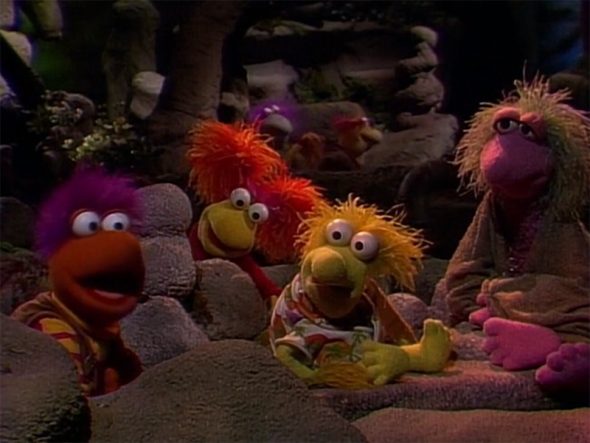
Strongest Moment: The final stretch when Gobo returns to the rock is a few short minutes of the platonic ideal for Fraggle Rock in its humor, its understanding of the characters, its gorgeous music, and its big thoughts about how being a person works.
Weakest Moment: I have such a hard time with the tiny robot Fraggles. They’re so rigid and lifeless, which might not bother me as much if the usual puppets weren’t designed for maximum expression.
Best Joke: When Gobo tells Junior to give the Fraggles back their moon, he says he can’t do that. Gobo retorts, “Can’t or won’t?” Junior, befuddled, replies, “Uh… both?” Gobo concludes that he must then have their moon.
MVF (Most Valuable Fraggle): Wembley. While this is a Gobo episode, the writers figured out by this point how to make Wembley a perfect supporting character even when his part is small.
First Appearance of…: Henchy! Note that World’s Oldest hits the top part of his hat, not his head. I think they eventually forgot about that.
Musical Highlight: I mean, of course it’s “Shine on Us Now”, but watching this episode a few times for this review, I’ve developed quite the appreciation for the song “Sail Away”. It’s very pretty!
One More Thing…: There’s a fascinating moment near the beginning when Doc has just talked about people trying to capture the moon, then Gobo wakes up from a dream about the very same thing. It almost suggests that the Doc and Sprocket opening was Gobo’s dream. Junior spends the whole episode unsure of whether he’s asleep or awake, and Wembley remarks at the end that it feels like their whole adventure could have been a dream. The artifice of the moon, as seen in the first shot after the theme song, combined with the theatricality of Gobo’s performance at the Fraggle Pond helps create the subtle surrealism that makes this whole episode a strange and dreamy trip.
Okay, One More Thing…: One gets the sense from episodes like this that the writing process began with total free association, as though they put the word “moon” on the white board and everyone started riffing on it. Someone thought of dogs howling, someone else listed pretty things in the sky like rainbows, someone else thought of dreams, and so on until they’d played with every part of the concept. These loose connections running throughout the show give the episode the appearance of having its own subconscious. I don’t know what they’re real writing process was, but whatever they did, they gave me a lot to think about, and now I’m going to bed.
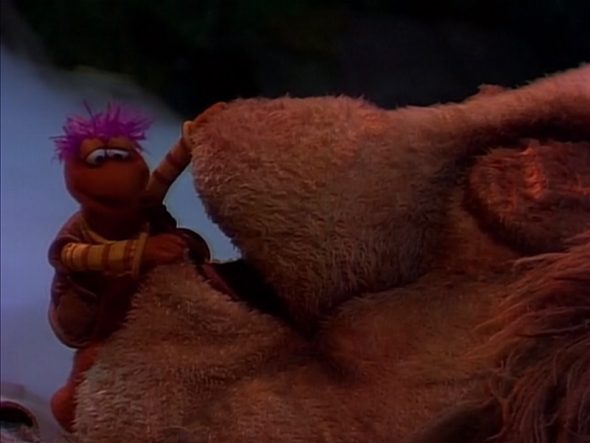
Click here to lasso the moon for me on the ToughPigs forum!
By J.D. Hansel

